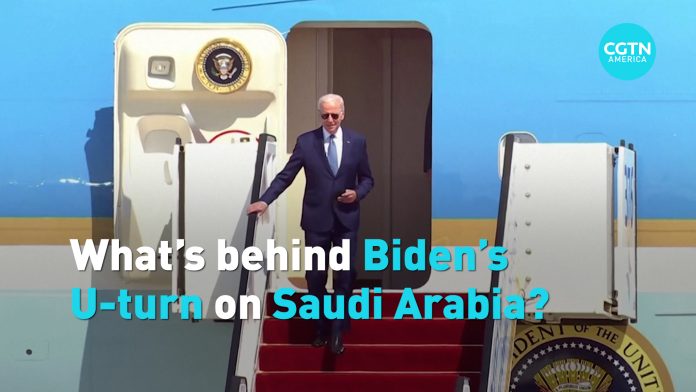Clearly, the Biden administration’s apparent efforts to punish and isolate Saudi Crown Prince, Mohammed bin Salman over the the killing of Jamal Khashoggi were over
“We were going to, in fact, make them [Saudi Arabia] pay the price, and make them, in fact, the par*** that they are,” Joe Biden said in November 2019 during a presidential campaign event.
“They have to be held accountable,” he added. After assuming the Presidency in January 2021, Mr. Biden released a U.S. intelligence assessment that concluded that Mohammed bin Salman, the Crown Prince and de facto ruler of Saudi Arabia, ordered the killing of Jamal Khashoggi, the Saudi dissident and Washington Post columnist.
Khashoggi was killed and dismembered in October 2018 inside the Kingdom’s consulate in Istanbul. President Biden refused to talk directly to MBS, as Prince Mohammed is widely called.
The administration also announced that it was ending America’s support for Saudi Arabia’s war on Yemen. Speculations were rife that the U.S.-Saudi strategic alliance that goes back to the 1945 meeting between President Franklin D. Roosevelt and Saudi King Abdul Aziz Ibn Saud was in peril.
Not really.
One and a half years later, President Biden travelled to Saudi Arabia to reset ties with the Kingdom. In Jeddah, the port city on the Red Sea coast, Mr. Biden fist-bumped with MBS, and held talks with him and other senior officials of the Kingdom. A week before the meeting, State Secretary Antony Blinken had called Saudi Arabia a “critical partner” in dealing with extremism in West Asia and challenges posed by Iran. Clearly, the Biden administration’s apparent efforts to punish and isolate MBS were over. What is behind this U-turn?
Abraham Accords
Three major geopolitical developments that were no in the White House’s direct control seemed to have pushed Mr. Biden to adopt a more traditional approach towards America’s allies in the region, even at the expense of contradicting the promises candidate Biden had made. First, the Abraham Accords, the set of agreements that saw Israel and four Arab countries (the UAE, Bahrain, Morocco and Sudan) normalise ties under the aegis of the Trump administration, brought in structural changes in the geopolitical alignment of West Asia. Israel and Arab countries had backroom contacts for decades.
Also Read: Biden says he raised Khashoggi murder with Saudi Crown Prince
But with Abraham Accords, these two sides, the two pillars of America’s West Asia policy, have taken formal steps to build a new political, economic and security partnership, seeking to counter Iran. The Biden administration, after the initial confusion on whether it should go back to the Obama-era realism or the Trump-model partnership with allies, appears to have concluded that it should take the latter path. So if the U.S. is seeking to further strengthen the growing Arab-Israel partnership, the logical next step is to get Saudi Arabia to normalise ties with Israel.
Iran factor
Second, reviving the Iran nuclear deal proved to be difficult. Barack Obama had taken a narrowly focused view of America’s goals in West Asia. He advocated a “Cold Peace” between Iran and Sunni Arabs, overlooked Israel’s protests and went ahead with the nuclear deal which cut off Iran’s path towards bomb. But Mr. Trump, unanimously pulled the U.S. out of the nuclear deal and promoted stronger ties between Israel and Sunni Arabs. Mr. Biden took a mixed approach of trying to revive the nuclear deal, while further strengthening the Israel-Arab partnership. But the Iran deal remained elusive.
During the Obama era, Iran had a moderate President who was ready to cut a deal. Now, all branches of the Iranian state are controlled by hardliners. Iran has also entered into a 25-year economic cooperation agreement, and it is soon expected to join the Shanghai Cooperation Organisation. Mr. Biden finds an emboldened Iran in talks, which refused to make any more concession than the 2015 deal sought for. On the other side, Iran wants the U.S. to remove the terrorist designation of the Islamic Revolutionary Guard Corps (IRGC), a Trump decision.
READ ALSO: US-Saudi ties: Biden meets with Saudi’s MBS, raises killing of journalist Khashoggi
Mr. Biden, who is facing collective strong opposition from Israel and Sunni Arabs against making any more concession to Iran, refused to remove the terrorist tag, which brought the nuclear talks to a halt, for now. Faced with uncertainty on the Iran deal, the Biden administration seems to have decided to double down on the other aspect of its West Asia policy–strengthen the Israel-Sunni Arab bloc. For this, Saudi Arabia’s support is essential. The U.S. has negotiated a deal between Saudi Arabia, Egypt and Israel that would see Egypt transferring the sovereignty of two Red Sea islands — Tiran and Sanafir — to Saudi Arabia.
Ukraine war
Third, the Ukraine war. Russia’s February 24 invasion of Ukraine and the West’s push to punish President Vladimir Putin for the aggression has disrupted the global energy markets, turning the cost of living crisis in western countries worse. The U.S. has banned Russian oil. The EU is phasing out 90% of Russian oil imports and is planning to impose an insurance ban on tankers carrying Russian fuel. Crude prices in the international market are already hovering around $100 a barrel. Once the insurance ban kicks in, prices could jump further. It would make the inflation crisis in the West – in the U.S. it has hit a 41-year high at 9.1%–worse.
Mr. Biden, whose Democratic Party faces grim prospects in November midterm elections, wants Saudi Arabia to pump in more oil into the market to steady prices. Saudi Arabia is one of the few countries that have excess capacity to ramp up production. The others are Venezuela and Iran, both under American sanctions. So, to punish Russia, one of the largest oil and gas producers in the world, while keeping the impact of those measures on western economies at minimum, the U.S. needs Mohammed bin Salman’s Saudi Arabia.













